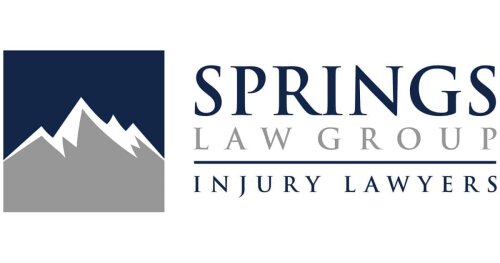Best Car Accident Lawyers in Colorado
Share your needs with us, get contacted by law firms.
Free. Takes 2 min.
Or refine your search by selecting a city:
List of the best lawyers in Colorado, United States

About Car Accident Law in Colorado, United States
Car accident law in Colorado falls under the broader category of personal injury law, which deals with injuries and damages resulting from vehicle collisions. Colorado operates as a "fault" state when it comes to car accidents, meaning the party responsible for causing the accident can be held liable for any resulting damages or injuries. Colorado also follows a modified comparative negligence rule, which can impact how damages are awarded if more than one party is at fault. If you have been involved in a car accident, it is essential to understand your rights, responsibilities, and the legal options available to you in Colorado.
Why You May Need a Lawyer
Car accident cases can become complex quickly, especially when it comes to determining fault, negotiating with insurance companies, or dealing with severe injuries. You may need a lawyer if:
- You sustained serious injuries that require medical treatment
- There is a dispute regarding who was at fault for the accident
- The insurance company offers a settlement that does not cover your expenses
- Multiple vehicles or parties are involved
- You are facing significant pain and suffering or lost wages
- The insurance company denies your claim
- You need help collecting evidence or dealing with police reports
- A loved one was killed or incapacitated due to the crash
Local Laws Overview
Colorado has specific laws that govern how car accident claims are managed. Here are some key aspects:
- Fault System: Colorado is a fault-based state, so the party responsible for the accident is generally liable for damages.
- Comparative Negligence: If you are found partially at fault for the accident, your compensation may be reduced by your percentage of fault. If you are found 50 percent or more at fault, you may not recover damages.
- Statute of Limitations: Colorado law gives you three years from the date of the accident to file a lawsuit for personal injury or property damage resulting from a car accident.
- Minimum Insurance Requirements: All Colorado drivers are required to carry liability insurance of at least 25,000 dollars per person and 50,000 dollars per accident for bodily injury, plus 15,000 dollars for property damage.
- Reporting Requirements: Accidents resulting in injury, death, or property damage above 1,000 dollars must be reported to law enforcement.
Frequently Asked Questions
What should I do immediately after a car accident in Colorado?
Ensure your safety first by moving to a safe location if possible. Check for injuries and call 911 if anyone is harmed. Exchange contact and insurance information with the other driver, take photos of the accident scene, and report the accident to law enforcement if required.
How is fault determined in a car accident?
Fault is determined by examining evidence such as police reports, eyewitness statements, photos, and other relevant information. Insurance adjusters and, if necessary, the courts will review the facts to assign fault.
What does it mean that Colorado is a modified comparative negligence state?
This means if you are less than 50 percent at fault, you can recover damages, but your compensation will be reduced by your percentage of fault. If you are 50 percent or more at fault, you cannot recover damages from the other party.
Do I have to report every car accident to the police?
You must report accidents to law enforcement if they involve injury, death, or property damage exceeding 1,000 dollars. It is generally a good idea to file a report for documentation purposes even in minor accidents.
How long do I have to file a lawsuit after a car accident in Colorado?
You have three years from the date of the accident to file a personal injury or property damage lawsuit based on a car accident in Colorado.
What types of damages can I recover after a car accident?
You may be eligible to recover medical expenses, lost wages, property damage, pain and suffering, and, in certain cases, punitive damages.
Will my insurance rates go up after a car accident?
If you are found at fault, it is likely your insurance premiums will increase. If you are not at fault, your rates may not change, but this depends on your insurance company’s policies.
What if the other driver does not have insurance?
You may be able to make a claim under your own uninsured or underinsured motorist coverage, if you have it. Colorado law does not require this coverage, but insurers must offer it to policyholders.
Can I still get compensated if I was partially at fault?
Yes, as long as you are less than 50 percent at fault. Your compensation will be reduced by your percentage of fault under Colorado's comparative negligence law.
What happens if the accident involved a government vehicle?
Claims against governmental entities are governed by the Colorado Governmental Immunity Act and have specific notice requirements and time limits, often shorter than standard claims. Consulting an attorney is highly recommended.
Additional Resources
If you need more information or support, consider consulting these resources:
- Colorado Department of Motor Vehicles - information about accident reporting and driver requirements
- Colorado Division of Insurance - for questions about required car insurance
- Colorado Judicial Branch - for information on civil lawsuits and small claims court
- Colorado Bar Association - for attorney referrals and legal information
- Local law enforcement agencies for accident reporting and police reports
Next Steps
If you have been involved in a car accident in Colorado and believe you need legal advice, here are some steps to take:
- Seek prompt medical attention for any injuries, regardless of severity
- Gather and organize all accident-related documentation, including police reports, medical records, and correspondence with insurance companies
- Contact your insurance company to report the accident and start the claims process
- Reach out to a qualified car accident attorney, especially if you are facing significant injuries, disputed fault, or complications with insurance companies
- Consult the additional resources listed above for more support or referrals
- Do not discuss fault or accept any settlement offers before consulting with an attorney, as this can impact your legal rights and compensation
Lawzana helps you find the best lawyers and law firms in Colorado through a curated and pre-screened list of qualified legal professionals. Our platform offers rankings and detailed profiles of attorneys and law firms, allowing you to compare based on practice areas, including Car Accident, experience, and client feedback.
Each profile includes a description of the firm's areas of practice, client reviews, team members and partners, year of establishment, spoken languages, office locations, contact information, social media presence, and any published articles or resources. Most firms on our platform speak English and are experienced in both local and international legal matters.
Get a quote from top-rated law firms in Colorado, United States — quickly, securely, and without unnecessary hassle.
Disclaimer:
The information provided on this page is for general informational purposes only and does not constitute legal advice. While we strive to ensure the accuracy and relevance of the content, legal information may change over time, and interpretations of the law can vary. You should always consult with a qualified legal professional for advice specific to your situation.
We disclaim all liability for actions taken or not taken based on the content of this page. If you believe any information is incorrect or outdated, please contact us, and we will review and update it where appropriate.
Browse car accident law firms by city in Colorado
Refine your search by selecting a city.












